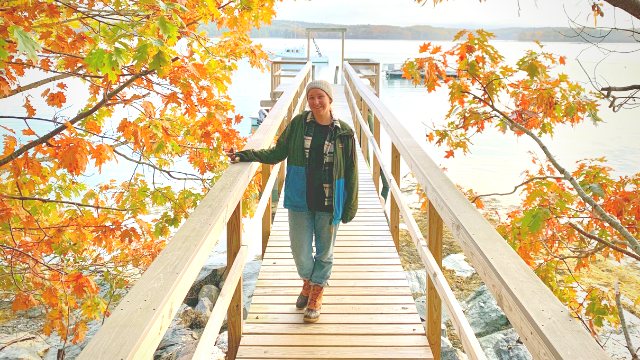
Meet Maine-eDNA: Kaitlyn Haynal, Postdoctoral Research Associate
Kaitlyn Haynal is Postdoctoral Research Associate working on Maine EPSCoR’s current NSF EPSCoR Track-1 program, Maine-eDNA. Her home department is the University of Maine’s Department of Communication and Journalism. Haynal works with her advisors Dr. Bridie McGreavy, an Associate Professor of Environmental Communication, and Dr. Heather Leslie, the Director of the Darling Marine Center. It was through UMaine’s system and the Maine-eDNA program that Haynal found a home for her work in Environmental Communication studies.
Haynal went into communication as an undergraduate because she felt it was a widely applicable skill that could be channeled towards whatever field she felt most interested in. Over the course of her studies, the field she felt most drawn to turned out to be environmental studies.
“I’ve always had an interest in supporting environmental work from a humanities perspective,” says Haynal. “Effective communication helps scientists, local community members, politicians, activists, institutes, and more, connect and advance important environmental research, education, and outreach, such as the work being done with the Maine-eDNA project.”
This interest in the environment is largely thanks to the frequent park visits she made during her time as a Ph.D. candidate at the University of Pittsburgh. Along with these experiences in nature, she has also found herself attached to coastal communities, such as those she grew up around in Long Island and the Outer Banks, and also now calls home in Maine. She enjoys being able to mix her love of nature and the environment with her communication research.
The opportunity to be part of a large transdisciplinary project rooted in collaboration and public outreach was one of the main reasons she was interested in the postdoctoral research position at UMaine. In addition, she holds a great interest in studying rhetoric itself. “One of the things that I really like about studying rhetoric, is that it really forces you to get out and get to know the communities that you’re writing about,” she explains.
“I’m specifically interested in spatial rhetoric,” Haynal says. “For example, looking at how climate change is impacting sense of place here in the Gulf of Maine. One of the projects in the Maine-eDNA program studying ‘species on the move’ suggests that there’s a need for new climate rhetoric to reflect the changes in how we understand and describe invasive, native, and non-native species.”
Due to challenges presented by the COVID-19 pandemic, Haynal also took a creative approach to her Maine-eDNA research, which studies how people with diverse backgrounds communicate during large collaborative and resilience-focused projects. Haynal is observing how communication is further influenced by COVID-19 related restrictions and adaptations.
For example, according to Haynal, some people have found that Zoom “levels the playing field” since everyone has to meet virtually, whereas only some would participate virtually prior to the pandemic.
Haynal enjoys the projects she works on with the Maine-eDNA program. “The work being done on the Maine-eDNA program is really novel, so I’m excited to see what happens over the next couple years here.”
